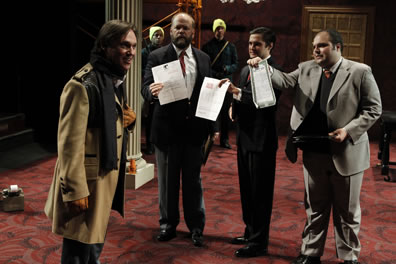Timon of Athens
Wall Street Puts Finishing Touches
on Bard’s Work
The Public Theater, Anspacher, New York City
Saturday, March 5, 2011, F–13&15 (Left in box theater)
Directed by Barry Edelstein

Richard Thomas' incredulous Timon is hounded by creditors in the Public Lab Theater's production of TImon of Athens at The Public Theater. Thomas presented an ever-smiling, ever-helpful, always-positive benefactor in the play’s first half. Photo by Joan Marcus, The Public Theater.
In the wake of the 2008 Wall Street meltdown, Public Theater tackled two commodities-centric plays in Shakespeare’s canon: The Merchant of Venice starring Al Pacino as Shylock—which we saw on Broadway two weeks before this writing—and this Timon of Athens in a Public LAB production starring TV and film star Richard Thomas in the title role. Director Barry Edelstein set this Timon in modern dress, the first half suggesting opulence with chandeliers and a giant silver bowl of caviar; but, oddly, the characters use adding machines and watch blue movies with an 8 mm film projector rather than using digital tools. In the second half, the plush rug was pulled up, and trap doors in the bare stage opened to sand pits while a canvas pulled across a portion of the stage served as Timon’s cave.
The problem with many of Shakespeare’s late works is lack of clear motive among key characters. This is magnified in Timon, which may be an unfinished play (many scholars feel it is a collaboration) and may never have made it to public performance in Shakespeare’s time. To me, its false starts, conflicting stage business, incomplete thoughts, and unrefined imagery read like a rough draft that, had Shakespeare cleaned it up, might have rivaled Coriolanus or Antony and Cleopatra. As it stands it’s a series of sometimes thrilling set pieces with a naked morality: excesses are bad, but hypocrisy is a truly destructive evil.
Aside from the script, this production itself seemed, in effect, unfinished. Many relevant motifs were left bubbling just under the surface but never allowed to fully flourish. Timon blows through his fortune by paying for friendships with expensive gifts and hosting lavish dinner parties. Is Timon just foolishly blind to the ramifications of his excesses? Is his benevolence his way of maintaining position and power over the rest of wealthy Athens? Or is he simply insecure, buying love for fear he cannot earn it in and of himself? Shakespeare hints at all of these motives, but the production didn’t delve into any one in a post–Lehman Bros. context. Thomas presented only an ever-smiling, ever-helpful, always-positive benefactor in the play’s first half, and it was hard to invest our attention in a tragic hero when he has no obvious tragic flaw. Thomas was much more effective in the second half when Timon’s singleness of purpose—hating all men—informed his speeches and actions, frantic and funny even in his fury.
This clear lack of motive in context also rendered Timon’s faithful steward, Flavius (played with perpetual concern and hurt by a sturdy Mark Nelson), a mere side note instead of the moral center that he could be, an underling who sees the catastrophe coming, suffers the consequences more than even Timon, and still stays duty bound. The production is a little more successful with Apemantus, the cynic portrayed by Max Casella as a hooded Banksy more interested in his disinterest than in trying to influence any positive outcome. But here in a Wall Street context was the potential for Apemantus to be a Michael Moore type, the documentarian whose smug righteousness grates but, darn it, if he doesn’t tell the truth.
Another modern context bubbled in the subplot of Alcibiades (Reg E. Cathey), the Athenian captain who, pleading for the life of a drunken lieutenant convicted of manslaughter, angers the senators so much they banish him, whereupon he raises an army to sack the city. Here Shakespeare touches on the conundrum facing today’s military leaders, who are held to the highest standards of accountability for those under their charge though it sometimes means sacrificing loyalty. Meanwhile, the politicians place their own authority ahead of gratitude for the decorated soldier.
Where the production most succeeded is in the faux friends preying on Timon. In the “winking” conniving capitalist, the self-righteous but duplicitous financier, the posing, egomaniacal mogul, and the indignant, social-climbing patriarch, Shakespeare, through Edelstein’s direction, seems to have written the cast for the Oscar-winning Inside Job documentary. The four actors—respectively, Chris McKinney, David Manis, Triney Sandoval, and Tom Bloom—doubled as the senators, and while they are different characters, to be sure, in this dual casting we can’t help seeing the merging of money and politics that ultimately sets the state on the route to ruin.
Meanwhile, the Poet (Greg McFadden) and the Painter (Orville Mendoza) are themselves portraits of egocentric, feigned humility, their affectations (if not their talents) giving them access to Athens’ elite. Edelstein staged an elaborate pun after the self-banished Timon finds gold and the Poet and Painter visit to siphon him of some of his newfound riches. Timon fed the two flatterers a meal of feces dipped in urine, which they dutifully eat and hum with approval (albeit, through clenched teeth). For the sake of gold and another chance to lap up caviar, these ciphers will literally eat s***.
Eric Minton
March 7, 2011
Comment: e-mail [email protected]
Start a discussion in the Bardroom



 Find additional Shakespeareances
Find additional Shakespeareances